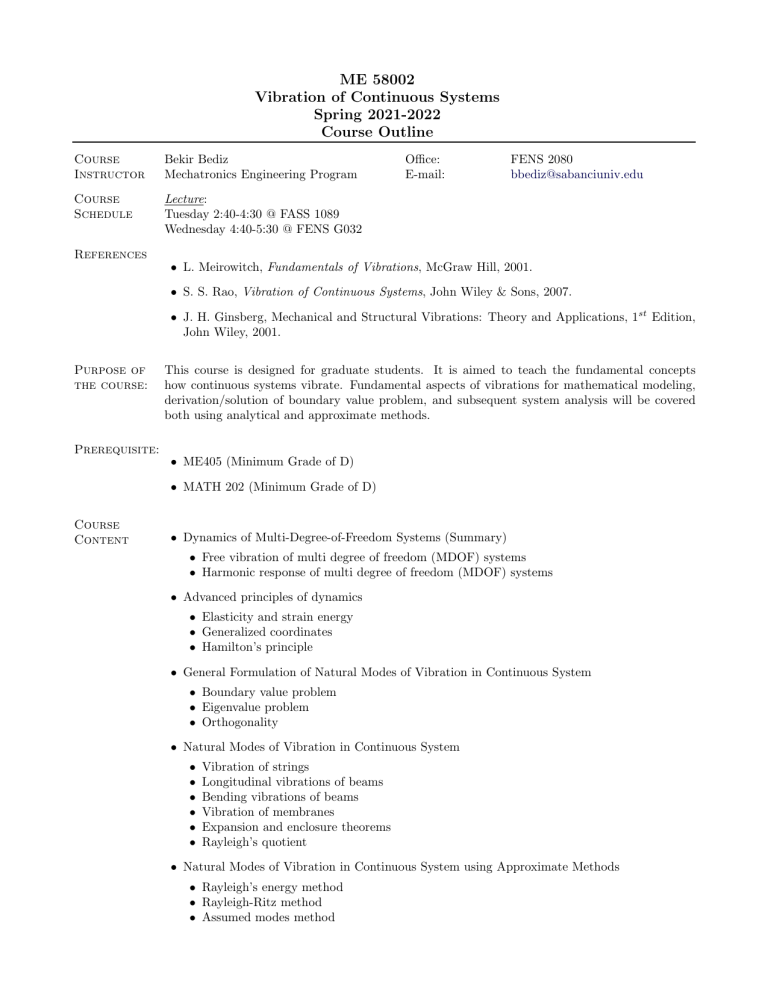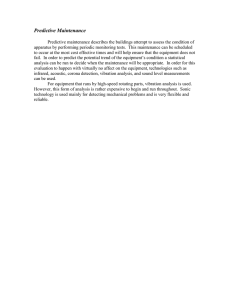
ME 58002 Vibration of Continuous Systems Spring 2021-2022 Course Outline Course Instructor Bekir Bediz Mechatronics Engineering Program Course Schedule Lecture: Tuesday 2:40-4:30 @ FASS 1089 Wednesday 4:40-5:30 @ FENS G032 References Office: E-mail: FENS 2080 bbediz@sabanciuniv.edu • L. Meirowitch, Fundamentals of Vibrations, McGraw Hill, 2001. • S. S. Rao, Vibration of Continuous Systems, John Wiley & Sons, 2007. • J. H. Ginsberg, Mechanical and Structural Vibrations: Theory and Applications, 1st Edition, John Wiley, 2001. Purpose of the course: Prerequisite: This course is designed for graduate students. It is aimed to teach the fundamental concepts how continuous systems vibrate. Fundamental aspects of vibrations for mathematical modeling, derivation/solution of boundary value problem, and subsequent system analysis will be covered both using analytical and approximate methods. • ME405 (Minimum Grade of D) • MATH 202 (Minimum Grade of D) Course Content • Dynamics of Multi-Degree-of-Freedom Systems (Summary) • Free vibration of multi degree of freedom (MDOF) systems • Harmonic response of multi degree of freedom (MDOF) systems • Advanced principles of dynamics • Elasticity and strain energy • Generalized coordinates • Hamilton’s principle • General Formulation of Natural Modes of Vibration in Continuous System • Boundary value problem • Eigenvalue problem • Orthogonality • Natural Modes of Vibration in Continuous System • • • • • • Vibration of strings Longitudinal vibrations of beams Bending vibrations of beams Vibration of membranes Expansion and enclosure theorems Rayleigh’s quotient • Natural Modes of Vibration in Continuous System using Approximate Methods • Rayleigh’s energy method • Rayleigh-Ritz method • Assumed modes method • Galerkin’s method • Response of Undamped Continuous System • Modal analysis • Assumed modes method • Galerkin’s method Grading Policy The tentative grading policy is as follows: 1. Homework (20%) 2. Midterm I & II (20% each) 3. Project (40%) • There will be 2 midterm exams (around 90 minutes) throughout the semester. • One make-up examination, covering the whole course material, will be given during the Finals Week for the students who miss any of the exams due to a valid excuse approved by the faculty/medical center. All examinations will be closed book and notes. The necessary formula will be provided to the students. • Homework will be distributed via SUCourse and are due at the beginning of class. Zero credit for late homework unless arrangements are made in advance. You can discuss the problems with your classmates but copying work is against University regulations. • All solutions must be written in a professional manner. You may lose points for poorly written answers. • No extra exam/project/etc. will be given to increase your grade at the end of the semester. • You are expected to sign in with your name & surname to the Zoom lectures. If your attendance is less than 50%, you will fail the course automatically. • Students who miss any two exams will get N/A from the course. • Oral exam (that will be recorded) will be given to students whose quiz/exam answers seem suspicious. Online Lecture Policy • Lectures will be hybrid. For those who wish to attend online, lectures will be held via Zoom. • Students cannot share or post to the Web any document (lecture slides, quiz/exam questions, etc.) or recording of any of the course material with third parties. Disclaimer • Time conflict requests can be accepted; however, students who are registered to the course with time-conflict override accept the responsibility of any inconvenience that might occur due to missed content and/or quizzes. No make-up will be available for missed quizzes/content. • This syllabus and course details might need to be updated throughout the semester because of the uncertainties the pandemic brings. Any modification will be announced at SUCourse+ and also during the class. Students are responsible from following the announcements. Academic Integrity Students are expected to be familiar with and comply with Sabanci University Academic Integrity Statement. Any form of academic dishonesty (plagiarism, copying/using other people’s work, attending classes/exams on behalf of other people, etc.) will be penalized with a failing grade for the related assignment, quiz, or exam and disciplinary actions will be taken.

